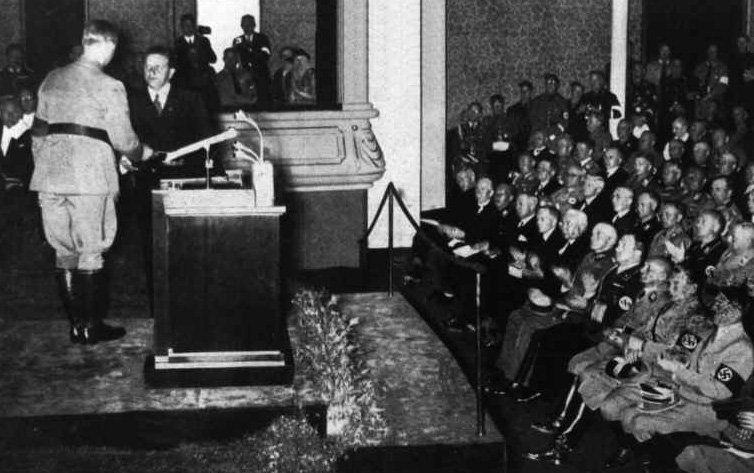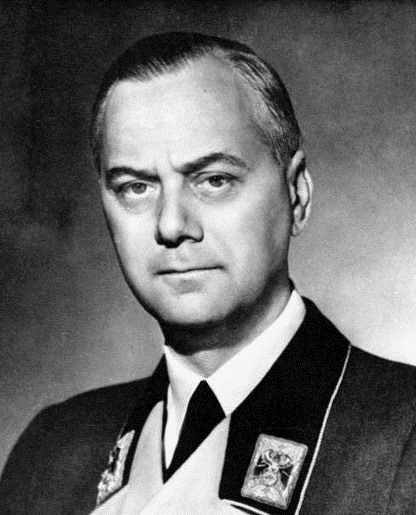|
Hanns Johst
Hanns Johst (8 July 1890 – 23 November 1978) was a German poet and playwright, directly aligned with Nazi philosophy, as a member of the officially approved writers’ organisations in the Third Reich. The statement “When I hear the word culture, I reach for my gun”, variously misattributed to Heinrich Himmler, Joseph Goebbels and Hermann Göring, was in fact a corrupted version of a line in his play ''Schlageter''. Background Hanns Johst was born in Seerhausen as the son of an elementary school teacher. He grew up in Oschatz and Leipzig. As a juvenile he planned to become a missionary. When he was 17 years old he worked as an auxiliary in a Bethel Institution. In 1910 he earned his Abitur in Leipzig and then started studying medicine and philosophy and—later—history of art. He volunteered for the army in 1914. In 1918 he settled down in Allmannshausen (part of Berg) at the Starnberger See. Early work His early work is influenced by Expressionism. Examples include ... [...More Info...] [...Related Items...] OR: [Wikipedia] [Google] [Baidu] |
Hermann Göring
Hermann Wilhelm Göring (or Goering; ; 12 January 1893 – 15 October 1946) was a German politician, military leader and convicted war criminal. He was one of the most powerful figures in the Nazi Party, which ruled Germany from 1933 to 1945. A veteran World War I fighter pilot ace, Göring was a recipient of the ("The Blue Max"). He was the last commander of ''Jagdgeschwader'' 1 (Jasta 1), the fighter wing once led by Manfred von Richthofen. An early member of the Nazi Party, Göring was among those wounded in Adolf Hitler's failed Beer Hall Putsch in 1923. While receiving treatment for his injuries, he developed an addiction to morphine which persisted until the last year of his life. After Hitler became Chancellor of Germany in 1933, Göring was named as minister without portfolio in the new government. One of his first acts as a cabinet minister was to oversee the creation of the Gestapo, which he ceded to Heinrich Himmler in 1934. Following the establishment of t ... [...More Info...] [...Related Items...] OR: [Wikipedia] [Google] [Baidu] |
Alfred Rosenberg
Alfred Ernst Rosenberg ( – 16 October 1946) was a Baltic German Nazi theorist and ideologue. Rosenberg was first introduced to Adolf Hitler by Dietrich Eckart and he held several important posts in the Nazi government. He was the head of the NSDAP Office of Foreign Affairs during the entire rule of Nazi Germany (1933–1945), and led Amt Rosenberg ("Rosenberg's bureau"), an official Nazi body for cultural policy and surveillance, between 1934 and 1945. During World War II, Rosenberg was the head of the Reich Ministry for the Occupied Eastern Territories (1941–1945). After the war, he was convicted of crimes against peace; planning, initiating and waging wars of aggression; war crimes; and crimes against humanity at the Nuremberg trials in 1946. He was sentenced to death and executed on 16 October 1946. The author of a seminal work of Nazi ideology, '' The Myth of the Twentieth Century'' (1930), Rosenberg is considered one of the main authors of key Nazi ide ... [...More Info...] [...Related Items...] OR: [Wikipedia] [Google] [Baidu] |
Christian Dietrich Grabbe
Christian Dietrich Grabbe (11 December 1801 – 12 September 1836) was a German dramatist of the '' Vormärz'' era. He wrote many historical plays conceiving a disillusioned and pessimistic world view, with some shrill scenes. Heinrich Heine saw him as one of Germany's foremost dramatists, calling him "a drunken Shakespeare" and Sigmund Freud described Grabbe as "an original and rather peculiar poet." Life Born in Detmold, the son of a prison officer, he began to write plays in the age of sixteen, while attending the '' Gymnasium''. A scholarship awarded by Princess Pauline enabled him to study law at the universities of Leipzig and Berlin, where he became acquainted with Heinrich Heine. After graduating in 1823, he unsuccessfully applied as a theatre director. Grabbe returned to Detmold, he passed the final '' Staatsexamen'' and tried to find an employment as a legal officer, though also to no avail. Finally in 1826 he was appointed to act as a military legal adviso ... [...More Info...] [...Related Items...] OR: [Wikipedia] [Google] [Baidu] |
Baal (play)
''Baal'' was the first full-length play written by the German modernist playwright Bertolt Brecht.Willett (1967, 22-23). It concerns a wastrel youth who becomes involved in several sexual affairs and at least one murder. It was written in 1918, when Brecht was a 20-year-old student at Munich University, in response to the expressionist drama ''The Loner'' (''Der Einsame'') by the soon-to-become-Nazi dramatist Hanns Johst. The play is written in a form of heightened prose and includes four songs and an introductory choral hymn ("Hymn of Baal the Great"), set to melodies composed by Brecht himself. Brecht wrote it prior to developing the dramaturgical techniques of epic theatre that characterize his later work, although he did re-work the play in 1926. Characters * Baal - ''poet'' * Mech - ''merchant and publisher'' * Emilie - ''Mech's wife'' * Dr. Piller - ''critic'' * Johannes Schmidt * Pschierer - ''director of the water rates'' * A Young Man * A Young Woman * Johanna * Ekart ... [...More Info...] [...Related Items...] OR: [Wikipedia] [Google] [Baidu] |
Bertolt Brecht
Eugen Berthold Friedrich Brecht (10 February 1898 – 14 August 1956), known professionally as Bertolt Brecht, was a German theatre practitioner, playwright, and poet. Coming of age during the Weimar Republic, he had his first successes as a playwright in Munich and moved to Berlin in 1924, where he wrote '' The Threepenny Opera'' with Kurt Weill and began a life-long collaboration with the composer Hanns Eisler. Immersed in Marxist thought during this period, he wrote didactic '' Lehrstücke'' and became a leading theoretician of epic theatre (which he later preferred to call "dialectical theatre") and the . During the Nazi Germany period, Brecht fled his home country, first to Scandinavia, and during World War II to the United States, where he was surveilled by the FBI. After the war he was subpoenaed by the House Un-American Activities Committee. Returning to East Berlin after the war, he established the theatre company Berliner Ensemble with his wife and long-time col ... [...More Info...] [...Related Items...] OR: [Wikipedia] [Google] [Baidu] |
Thomas Paine
Thomas Paine (born Thomas Pain; – In the contemporary record as noted by Conway, Paine's birth date is given as January 29, 1736–37. Common practice was to use a dash or a slash to separate the old-style year from the new-style year. In the old calendar, the new year began on March 25, not January 1. Paine's birth date, therefore, would have been before New Year, 1737. In the new style, his birth date advances by eleven days and his year increases by one to February 9, 1737. The Old Style and New Style dates, O.S. link gives more detail if needed. – June 8, 1809) was an English-born American political activist, philosopher, political theorist, and revolutionary. He authored ''Common Sense'' (1776) and ''The American Crisis'' (1776–1783), two of the most influential pamphlets at the start of the American Revolution, and helped inspire the Patriot (American Revolution), Patriots in 1776 to declare independence from Kingdom of Great Britain, Great Britain, hitherto an unpo ... [...More Info...] [...Related Items...] OR: [Wikipedia] [Google] [Baidu] |
Naturalism (philosophy)
In philosophy, naturalism is the idea or belief that only Physical law, natural laws and forces (as opposed to supernatural ones) operate in the universe. According to philosopher Steven Lockwood, naturalism can be separated into an ontological sense and a methodological sense. "Ontological" refers to ontology, the philosophical study of what exists. On an ontological level, philosophers often treat naturalism as equivalent to materialism. For example, philosopher Paul Kurtz argues that nature is best accounted for by reference to Matter, material principles. These principles include mass, energy, and other Physical property, physical and Chemical property, chemical properties accepted by the scientific community. Further, this sense of naturalism holds that spirits, Deity, deities, and ghosts are not real and that there is no "Teleology, purpose" in nature. This stronger formulation of naturalism is commonly referred to as ''metaphysical naturalism''. On the other hand, the more ... [...More Info...] [...Related Items...] OR: [Wikipedia] [Google] [Baidu] |
Expressionism
Expressionism is a modernist movement, initially in poetry and painting, originating in Northern Europe around the beginning of the 20th century. Its typical trait is to present the world solely from a subjective perspective, distorting it radically for emotional effect in order to evoke moods or ideas. Expressionist artists have sought to express the meaningVictorino Tejera, 1966, pages 85,140, Art and Human Intelligence, Vision Press Limited, London of emotional experience rather than physical reality. Expressionism developed as an avant-garde style before the First World War. It remained popular during the Weimar Republic,Bruce Thompson, University of California, Santa Cruzlecture on Weimar culture/Kafka'a Prague particularly in Berlin. The style extended to a wide range of the arts, including expressionist architecture, painting, literature, theatre, dance, film and music. The term is sometimes suggestive of angst. In a historical sense, much older painters such as ... [...More Info...] [...Related Items...] OR: [Wikipedia] [Google] [Baidu] |
Starnberger See
Lake Starnberg, or ''Starnberger See'' ) — called Lake Würm, or ''Würmsee'' , until 1962 — is Germany's second-largest body of fresh water, having great depth, and fifth-largest lake by area. It and its surroundings lie in three different Bavarian districts, or ''Landkreise''. The lake is property of the state and accordingly managed by the Bavarian Administration of State-Owned Palaces, Gardens and Lakes. Located in southern Bavaria southwest of Munich, Lake Starnberg is a popular recreation area for the city and, since 1976, one of the wetlands of international importance protected by the Ramsar Convention. The small town of Berg is famous as the site where King Ludwig II of Bavaria was found dead in the lake in 1886. Because of its associations with the Wittelsbach royal family, the lake is also known as Fürstensee (Prince's Lake). It is also mentioned in T. S. Eliot's poem ''The Waste Land''. Overview The lake, lying in a ''zungenbecken'' or glacial hollow, was crea ... [...More Info...] [...Related Items...] OR: [Wikipedia] [Google] [Baidu] |
Berg, Upper Bavaria
Berg is a municipality in the district of Starnberg in Bavaria, Germany, on the shore of the Starnberg Lake. It is most famous for the royal Berg Castle. Notable residents German baritone Dietrich Fischer-Dieskau Dietrich Fischer-Dieskau (28 May 1925 – 18 May 2012) was a German lyric baritone and conductor of classical music, one of the most famous Lieder (art song) performers of the post-war period, best known as a singer of Franz Schubert's Lieder, ... had a home in Berg, where he died in his sleep on 18 May 2012, 10 days before his 87th birthday. References Starnberg (district) {{Starnberg-geo-stub ... [...More Info...] [...Related Items...] OR: [Wikipedia] [Google] [Baidu] |
Abitur
''Abitur'' (), often shortened colloquially to ''Abi'', is a qualification granted at the end of secondary education in Germany. It is conferred on students who pass their final exams at the end of ISCED 3, usually after twelve or thirteen years of schooling (see also, for Germany, ''Abitur'' after twelve years). In German, the term has roots in the archaic word , which in turn was derived from the Latin (future active participle of , thus "someone who is going to leave"). As a matriculation examination, ''Abitur'' can be compared to A levels, the '' Matura'' or the International Baccalaureate Diploma, which are all ranked as level 4 in the European Qualifications Framework. In Germany Overview The ("certificate of general qualification for university entrance"), often referred to as ("''Abitur'' certificate"), issued after candidates have passed their final exams and have had appropriate grades in both the last and second last school year, is the document which cont ... [...More Info...] [...Related Items...] OR: [Wikipedia] [Google] [Baidu] |




_1988%2C_MiNr_Block_091.jpg)


